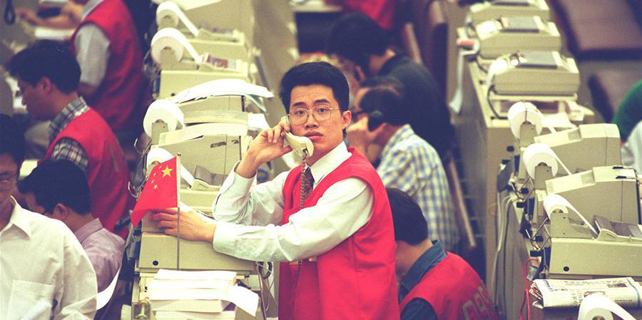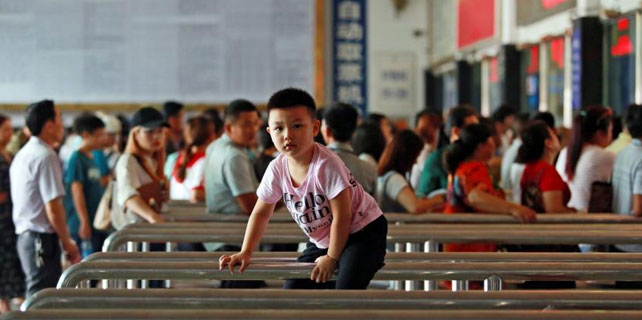Hong Kong scores brilliant achievements after return: People's Daily
On 29th June, People's Daily published an article under the byline of Ren Zhongping to summarize Hong Kong's brilliant achievements over the last 20 years after its return to the motherland.
The following is an abstract translation of the article:
The past 20 years since China resumed exercise of sovereignty over Hong Kong on July 1, 1997 proved the "one country, two systems" guideline as a gigantic success.
Hong Kong's advantageous position has been steadily elevated over the past 20 years. Hong Kong, together with New York and London, were dubbed "Nylonkong" for being the world's leading financial centers.
The US Heritage Foundation has chosen Hong Kong as the world's freest economy for 23 consecutive years considering its top position in healthy economy, free finance and trade. In the past 20 years, Hong Kong has kept on its global influence and competitiveness.
There had been feelings of insecurity before Hong Kong's return. But the place's development has broken many doubts about its future, as many people who chose to migrate have successively come back.
In 2017, the government of the Hong Kong Special Administrative Region (HKSAR) plans to spend 66.2 billion yuan ($900 million) on social welfare, 55 percent higher than four years ago. The government will give out free medical vouchers to citizens aged 70 or above, and it is still working to cut preschool fees.
Hong Kong is a place where people live longer than any other places in the world. In the past 20 years after its return, Hong Kong has maintained vitality.
Hong Kong is no longer subject to humiliation. Before 1997, the colonist preached that "British governor of Hong Kong comes after the God in terms of power". However, Hong Kong's return has opened a new historical era led by guidelines such as "one country, two systems" and "Hong Kong people administering Hong Kong" with a high degree of autonomy.
Figures released by the World Bank showed that political stability, government effectiveness, rule of law, control of corruption, and citizens' right to express in Hong Kong are far better than those before 1997.
In particular, Hong Kong's indicator of the rule of law, a core value of Hong Kong society, has jumped from behind 60th in the world in 1996 to the 11th place in 2015, ahead of some major Western countries. Hong Kong has kept moving forward in 20 years after return.
Even foreign observers have to admit that though Hong Kong's legal status has been changed, its freedom degree remains unchanged. Kurt Tong, U.S. consul general to the Hong Kong and Macao SARs, noted that the "one country, two systems" framework in the HKSAR has been largely successful.
Last year, a lecturer gave a lecture to students in University of Hong Kong. When she asked the attendees what's their enlightenment song, the audience sang chorus "my motherland", a popular and famous patriotic song. The video moved many people to tears after being posted online.
Consisting of a red flag with a bauhinia highlighted by five star-tipped stamens, the regional flag of the HKSAR echoes the five-star national flag, implying the inseparable ties between Hong Kong and the mainland. Over the past 20 years, Hong Kong and the mainland have formed an unbreakable community of common destiny.
Hong Kong is the largest source of overseas capital, the biggest overseas financing platform for mainland enterprises, as well as the world's largest offshore RMB center and RMB settlement center for transnational trade.
In the past, Hong Kong served as the contact person that linked the mainland with the rest of the world. Now its cooperation with the mainland has entered a new era. In future, combing the need of the whole country and its own strengths, Hong Kong will remain irreplaceable for the sustainable development of the nation.
Twenty years of practice is enough to show "one country, two systems" is not only the best solution to the Hong Kong question left over from history, but also the best institutional arrangement to sustain its long-term prosperity and stability since its return.
The guideline opened a new way to peacefully solve territory disputes and contributed wisdom to peaceful development of the world. Canada, disturbed by the Quebec issue, sent officials to Hong Kong to learn from the "one country, two systems" policy in order to gain some experience.
The brand-new political idea and concept is deemed as China's unique contribution to the governance pattern and political system of mankind.
Today's China is still an engine for the global economy. The massive market, ample opportunities and innovative concept as well as strong potential energy for economic transformation and upgrade from the mainland can firmly support and facilitate Hong Kong's future development.
("Ren Zhongping" is a famous opinion column of the People's Daily that mainly expresses views on big events.)






















